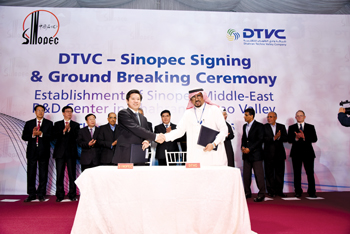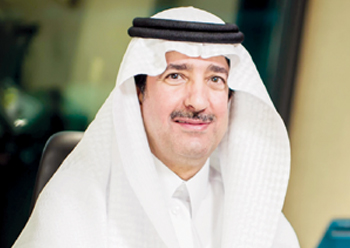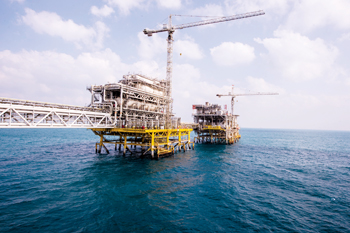

Dhahrain Techno Valley Company (DTVC), a wholly owned subsidiary of King Fahd University of Petroleum and Minerals (KFUPM), plans to move ahead with Phase 2 of the DTV Science Park and continue to attract technology companies to establish their research and innovation centres in the valley.
'We have planned to diversify our clientele from upstream oil and gas, process control and automation into downstream oil and gas, water technologies, renewables, and ICT. Furthermore, we plan to add multi-occupancy spaces into the mix of offerings at DTV Science Park. We believe this will enable small and medium enterprises to locate their technical operations in DTV,' says Dr Halim Hamid Redhwi, DTVC vice president.
On Saudi Vision 2030, he says the Dhahran Techno Valley’s mandate and vision are in full alignment with the objectives of Saudi Vision 2030. DTV aspires to become an integrated innovation ecosystem for value creation.
It means that DTVC is committed to economic diversification – moving from oil-based economy to knowledge-based economy, increase the participation of SMEs, foster development of newer technologies and services by nurturing and investing in early-stage opportunities. 'In a way, we are already moving ahead in parallel with many initiatives under this programme,' he says.
Attracting multi-national companies to set-up their research and technology centres in DTV is a paradigm shift not only for the companies but also for Saudi Arabia’s industry. Bringing foreign-direct investment (FDI) into the country alone is a significant achievement but DTVC is striving to achieve a multi-dimensional impact. It includes developing local talent in R&D and creating more technical jobs in the country.
More importantly, DTVC is looking for centres in the valley to develop new technologies and technical solutions that are not only deployed in Saudi Arabia but exported. These development activities are preferably done jointly with the involvement of researchers, faculty and students of KFUPM. All the above activities are elements of a knowledge-based society that will ultimately bring about transformation in Saudi Arabia, says Dr Redhwi.
On how the company has tailored its strategy to be in tune with Vision 2030, he says DTVC is a relatively new organisation with an evolving strategy that aligns with various relevant ministerial objectives, national champions such as Saudi Aramco, Sabic, SEC and others.
'More recently, we have reviewed the Vision 2030 and have identified our key focus objectives as – develop energy sector and create environment for world talents and investors. We have pivoted our strategy along these objectives in order to contribute to improving the business environment, attracting talent, and embracing transparency,' he says.
'Our target is to attract more technology companies to DTV and enable synergistic collaborations among the various stakeholders. We have clearly defined focus areas. It is envisaged that the presence of several technology companies in close proximity to KFUPM will foster more industry-academia collaborations, encourage entrepreneurship, attract local and international investments, promote new venture creation, create new job opportunities, and result in desired macro-economic impact,' he says.
DTVC supports the development of an integrated innovation ecosystem among a unique set of in-kingdom stakeholders including institutions of higher education; Saudi Aramco, the national oil company of Saudi Arabia; and other national champions and local and international companies.
DTVC’s objectives are to build community for energy-related technology development; strengthen linkages between KFUPM and the energy industry; align the technology and R&D agendas of the various stakeholders; and unlock the commercial value of intellectual property.
Dr Redhwi points out that the sharp decline in oil prices had a significant impact on R&D activities of all major corporations globally. 'As a result, we have witnessed downsizing in operations and manpower by many companies most of them are operational in DTV. In Saudi Arabia, especially in the oil and gas sector there has been lesser impact. Largely, due to the fact that Saudi Arabia continues with its oil production and maintained steady investment in this sector. This year, oil prices have improved compared to previous year and business environment has improved that is evident in the market sentiment as well as projects that are coming to fruition,' he says.
For companies operating in DTV Science Park, fall in oil prices have direct impact on their bottom line and consequently their R&D and technology development activities are downsized. This directly affects their operations and collaborations with stakeholders. Only the most resilient organisations continue to invest in R&D during the downturn so that they are ready to capture greater market share once the oil prices move north. 'Thankfully, at DTV we have many such brave and resilient corporations that continued their operations during this tough period. From DTVC’s point of view we did not have to consider market share and take measures to maintain the same.'
'Next year, we expect some of our existing partners in the Science Park to complete the construction of their respective technology and innovation centres and become operational. Ultimately, we would like to see more interactions and collaborations between the partner companies and major stakeholders especially KFUPM and Saudi Aramco resulting in new product developments,' he says.
Over the past year, several new initiatives and activities occurred within the DTV ecosystem. The most prominent developments include Air Products (an industrial gases manufacturing company) joined DTV Science Park to establish their innovation centre. Emerson completed the construction of its technology centre in DTV and started operations.














































































